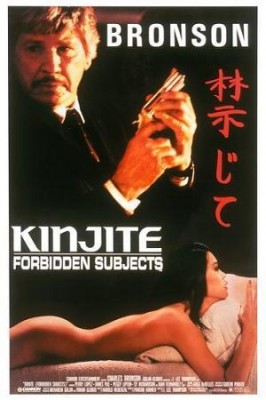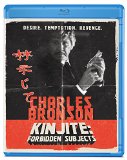| Reviews & Columns |
|
Reviews DVD TV on DVD Blu-ray 4K UHD International DVDs In Theaters Reviews by Studio Video Games Features Collector Series DVDs Easter Egg Database Interviews DVD Talk Radio Feature Articles Columns Anime Talk DVD Savant Horror DVDs The M.O.D. Squad Art House HD Talk Silent DVD
|
DVD Talk Forum |
|
|
| Resources |
|
DVD Price Search Customer Service #'s RCE Info Links |
|
Columns
|
|
|
Kinjite: Forbidden Subjects
Despite its particularly unsavory subject matter - trafficking minors for prostitution - the film is less ridiculous and more intelligent than most of Bronson's Cannon fodder. It has an unusual structure and dramatizes then-current social problems moviemakers generally avoided. It allows Bronson to portray an appealingly fully-dimensional, conflicted character while at the same time playing to the strengths of his screen image in ways largely absent from Messenger of Death. Some of the latter strains credibility, such as 68-year-old police detective Bronson clinging to the hook block of a car-crushing crane, but overall Kinjite is a lot more satisfying than one might expect.
The Cannon-Bronson formula almost always had plots revolving around particularly unsavory criminal acts, and in this respect Kinjite doesn't disappoint. Its opening titles slowly revealing the contents of a briefcase: a whip, a jar of Vaseline, a tube of lubricant, and at a big dildo. And yet the surprisingly intelligent screenplay by Harold Nebenzal turns on two seemingly disconnected narratives that eventually converge.
The first involves LAPD Vice Squad detective Lt. Crowe's (Bronson) efforts to nail a pimp named Duke (Dominican-born Juan Fernández), who kidnaps underage girls, transforms them into Stockholm Syndrome-stricken hookers for rich, creepy johns. At the time, the R-rated Kinjite struck many reviewers as incredibly trashy and exploitative, but by 2015 standards it's only slightly more graphic than what one finds on weekly prime-time network shows like Law & Order: SVU and Chicago P.D..
Lt. Crowe (the script provides him no first name), disgusted by years of vice detail, and channeling fears for his own teenage daughter's safety, becomes obsessed with nailing Duke. In an early scene Crowe humiliates one of Duke's customers by anally raping him with his own dildo (off-screen, thankfully). Crowe's partner, Eddie Rios (Perry Lopez), makes the understatement of the year dismissing Crowe's action as "[getting his] Irish up." (Lithuanian-American Charles Buchinsky's "Irish up?" Saints preserve us.)
Meanwhile, thousands of miles away in Tokyo, Hiroshi Hada (James Pax) is a typical young salaryman, upwardly mobile in Japan's runaway bubble economy, married to an absurdly traditional wife with whom they have a young teenaged daughter. He spends most nights drinking and carousing with co-workers. Blotto and on a crowded subway ride home he watches as a stranger groups a woman. Hada misinterprets her involuntary facial expressions and decision not to cry out during the assault as a consensual sexual act. (This sort of sexual assault is not uncommon in Japan.) Soon after, deviant Pax is transferred to his company's Los Angeles office where, on a commuter bus, he tries the same trick on a high school girl who turns out to be Crowe's daughter, Rita (Amy Hathaway).
The incident fuels Lt. Crowe's rage and determination to take down Duke who, in a wild coincidence, snatches Hada's daughter, Fumiko (Kumiko Hayakawa), from Macarthur Park.
One hesitates to use that overworked term "Shakespearean," especially applied to a gleefully sleazy Charles Bronson-Cannon film, but Nebenzal's clever script, at least structurally, has all the basic components of a Shakespearean or Greek tragedy. The writing also seems aware of this: at one point an outraged Lt. Rios complains to Crowe that, instead of following police procedure, "You've got to exact a biblical vengeance!"
Crowe's colorful acts of vengeance are real crowd pleasers that further strain credibility, things that would land most cops in the slammer, except maybe in Chicago or Ohio, where Crowe might instead receive a commendation. But, believably, he's an over-protective father of a daughter blossoming into womanhood, something he like millions of other fathers can't quite wrap his head around. And unlike, say, the Death Wish films, in which Bronson's character is explicitly exacting vengeance against horrible assaults, in Kinjite Crowe wants to clean up the streets before his daughter becomes a statistic. For all its sleaziness elsewhere, the domestic scenes with Crowe are well done and Bronson is almost sweetly paternal.
The Japanese angle was timely, when that country's runaway economic success (until the bubble burst) led to big Japanese corporations buying up a lot of Los Angeles real estate, sparking fear and resentment among many Americans, including Crowe, who lets loose with a few racist remarks: "They're taking over! You people - you think you own this town!" The generalization of Japanese businessmen reading porno manga and feeling up women on subways is overstated but not entirely inaccurate, either. Amazingly for a cheap Cannon production, a second unit shot several days in Tokyo, including the subway sequence with actor Pax and a few others, a sequence possibly stolen (i.e., shot on a real train, with real passengers as unknowing extras). However, all of the interiors set in Japan are over-emphatically Oriental in terms of their art direction and clearly filmed in Los Angeles. (Some of this footage seems to have been shot at the then New Otani Hotel.)
One eyebrow-raising scene was filmed at a Los Angeles Cobras-Chicago Bruisers game, the final regular season match of the Arena Football League team's only season.
Video & Audio
The 1.85:1 1080p transfer of Kinjite: Forbidden Subjects is far superior to Messenger of Death, begging the question as to whether this might be a newer video transfer. The image is pleasingly film-like with light grain, accurate color, and good contrast. The DTS-HD Master Audio stereo mix is perhaps less aggressive than Messenger of Death, but still quite good. No subtitles or alternate audio options.
Extra Features
Just the usual trailer.
Parting Thoughts
One of the best and most satisfying thrillers of Charles Bronson's Cannon Films era, Kinjite: Forbidden Subjects is Recommended.
Stuart Galbraith IV is the Kyoto-based film historian and publisher-editor of World Cinema Paradise. His new documentary and latest audio commentary, for the British Film Institute's Blu-ray of Rashomon, and commentary track for Arrow Video's Battles without Honor and Humanity are newly available.
|
| Popular Reviews |
| Sponsored Links |
|
|
| Sponsored Links |
|
|
| Release List | Reviews | Shop | Newsletter | Forum | DVD Giveaways | Blu-Ray | Advertise |
|
Copyright 2024 DVDTalk.com All Rights Reserved. Legal Info, Privacy Policy, Terms of Use,
Manage Preferences,
Your Privacy Choices | |||||||














